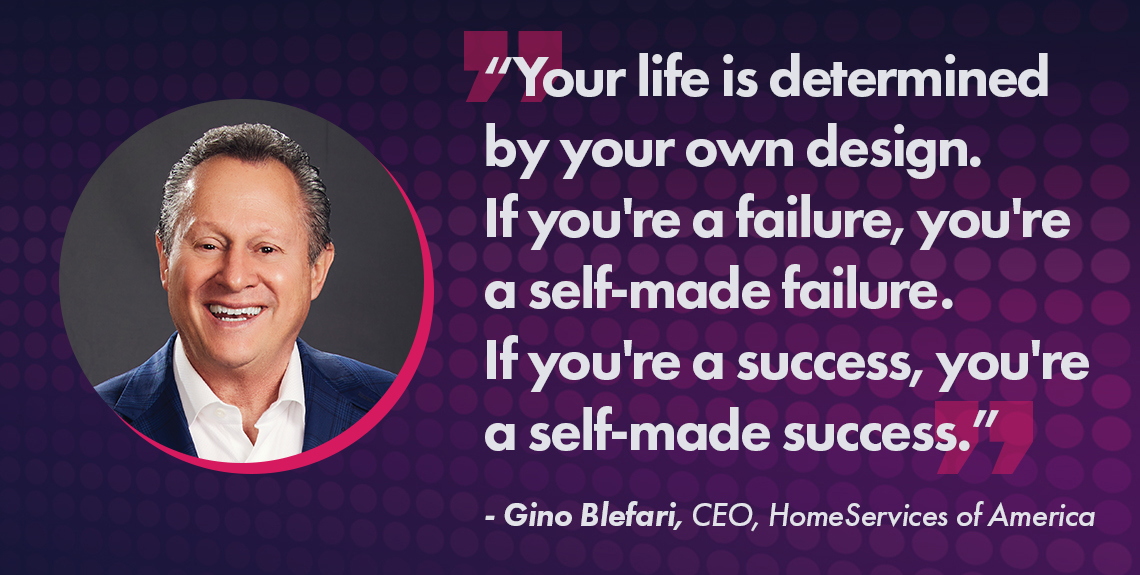No matter how many (or few) years you’ve been in the industry, you’ve likely encountered someone who has achieved tremendous success. And it’s only natural to try and find out how they got where they are. Luckily, those who have found their way to the top are often very accessible to those trying to better themselves. If you’re ready to catapult your career to the next level, these tried-and-true principles outlined by HomeServices of America CEO Gino Blefari will set you on the path to success both personally and professionally.
The first philosophy is that there will always be someone better, and one should aspire to reach higher levels. The second is that discontentment can be a source of inspiration and motivation for change. The third is the importance of finding mentors who can guide and inspire. The fourth is the commitment to hard work, emphasizing that success is not about charm or good looks, but rather, grit and character. The fifth has to do with the fact that struggle is necessary for human growth, and one should not shy away from challenges, while the sixth focuses on this being our season of change, the kickoff for 2024.

Blefari encourages everyone to continuously improve and become the best version of themselves. He noted why each of his principles have made sense for him, and why they can work for you.
“There will always be somebody who’s better,” he said. “There’s always another level. When we reach our stretch goal, what that means is we need to understand that our stretch goal is somebody else’s baseline. Now, I want my baseline to be a standard that most people don’t even aspire to. There’s never a place where we can get to and say, ‘I’ve made it. I’ve arrived.’ There’s somebody who’s creating distance from us, and our job is to catch up and pass them.”
“Inspirational discontent is your friend,” he continued. “What that really means is you’ll never make any dramatic change in your life until you become upset with where you are. To make any dramatic change, you have to become so upset with where you are that it moves you to do the things that you’ve been avoiding, the things that you’ve been procrastinating on, the things that you didn’t want to do. We can all do the busy work, right? We can all do the stuff that makes us feel like we’re achieving, but never mistake activity for achievement. When I’m frustrated with anything in my life, I use that as a tool to leverage that frustration so I can become better.”
“Find mentors who can take you from where you are today to somewhere entirely new,” stressed Blefari. “They can move you in ways you could never move yourself, and a mentor doesn’t have to be a physical person standing in front of you or somebody you’re calling or texting every day. You can have mentors between the pages of book covers, or on the other end of a podcast. You have to have mentors because you have to have people who have been where you want to go. You have to have people in your life who have already done what you do.”
“Commit to hard work,” he explained. “You might be witty, you might be charming. Those qualities aren’t enough anymore. You need grit. You need real character. You’ve got to work your face off. You can no longer coast on your varsity jacket. Those who have made it to the top outworked, outsacrificed, outgrew and outhustled everyone around them. Your life is determined by your own design. If you’re a failure, you’re a self-made failure. If you’re a success, you’re a self-made success. You navigate your own course in life.”
“Struggle is necessary for human growth,” articulated Blefari. “This is the tough love lesson. People need to experience adversity to grow strong enough to overcome it. It’s not the struggles that happen during the course of our lives that determine how well we’ve lived. It’s what we chose to do next. Those unexpected times of struggle will define our character and determine our happiness. Struggle is good. Struggle is real. Struggle is necessary to survive.”
“This is our season of change for 2024,” concluded Blefari. “To get better for our agents, to get better for our office, to get better for our company, to get better for our employees, to get better for our clients, to get better for our communities, to get better for our family. That’s what it is. It’s all about improving. How can we use this season of change and leverage it? Some companies will say they manage change really well, and I could never figure out why on Earth you would want to manage change. That’s like managing anger. Wouldn’t you rather leverage change? It’s entirely up to us. We can correct errors of the past and develop new disciplines for the future. Anyone can do this.”
Access your free replay of this session: The Right Mindset for 2024



